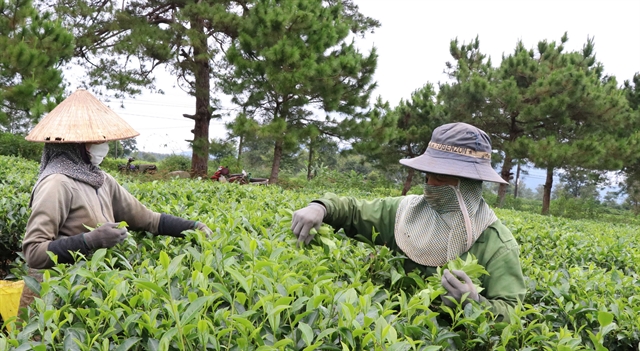 Economy
Economy

Being flexible in accessing distribution systems, overcoming logistical difficulties and making good use of free trade agreements (FTA) are important factors for Vietnamese goods to better access the Eurasian market in the coming time, said insiders.

|
| Workers of Biển Hồ Tea JSC harvest tea for exports to Russia and Eastern European countries. Two-way trade between Việt Nam and the Eurasian region hit US$12.7 billion in 2020, representing a year-on-year increase of 20.4 per cent. — VNA/VNS Photo Hồng Điệp |
HÀ NỘI — Being flexible in accessing distribution systems, overcoming logistical difficulties and making good use of free trade agreements (FTA) are important factors for Vietnamese goods to better access the Eurasian market, said insiders.
Tạ Hoàng Linh, director of the Europe-America Market Department under the Ministry of Industry and Trade (MoIT), said the large Eurasian region, consisting of 28 countries, stretching from Eastern Europe to Central Asia, is a potential export market for Việt Nam.
According to statistics of the General Department of Customs, two-way trade between Việt Nam and the Eurasian region hit US$12.7 billion in 2020, representing a year-on-year increase of 20.4 per cent, accounting for 2.3 per cent of Việt Nam’s total export turnover.
Despite difficulties caused by the COVID-19 pandemic, the two-way trade in the first 11 months of 2021 reached $12.7 billion, 13.1 per cent higher than that of the same period of 2020.
According to Vietnamese Trade Counselor in Russia Dương Hoàng Minh, Russia is one of the main partners of Việt Nam in the Eurasian market.
Russian people are becoming more interested in Vietnamese food, he said, noting that dried fruit such as mango and custard apple has gradually made inroads into this market.
Recently, the Eurasian Economic Union (EAEU) has removed 76 countries, including many of Việt Nam's export competitors to Russia and the EAEU in general like China, Malaysia, Turkey, Brazil, Peru, and Chile, from the list of those enjoying its tariff preferences.
Meanwhile, after 5 years of implementing the Việt Nam-EAEU FTA, most of Việt Nam's goods exported to the region are entitled to a zero per cent tax rate, Minh said, adding that this is an advantage for Vietnamese businesses to expand their exports, especially agro-forestry-aquaculture products, to Russia.
According to Natalia Zhynkina, Chargé d'Affaires of Ukraine in Việt Nam, her country needed to import $6.5 billion worth of agricultural products in 2021 but the import value from Việt Nam reached only $900 million. This shows that there is huge potential for Việt Nam to increase exports to the market.
In order to fully tap incentives from FTAs and promote import-export growth with the Eurasian market in general and the Russian market in particular, Vietnamese enterprises should actively conduct market surveys, join more trade fairs in Russia, and co-operate with Vietnamese firms operating in this country to introduce products in EAEU member states, Minh said. — VNS




